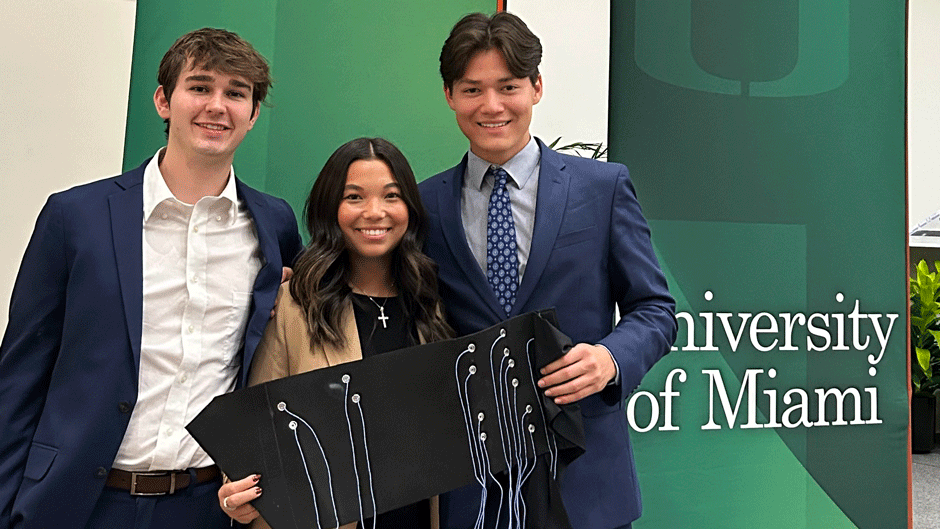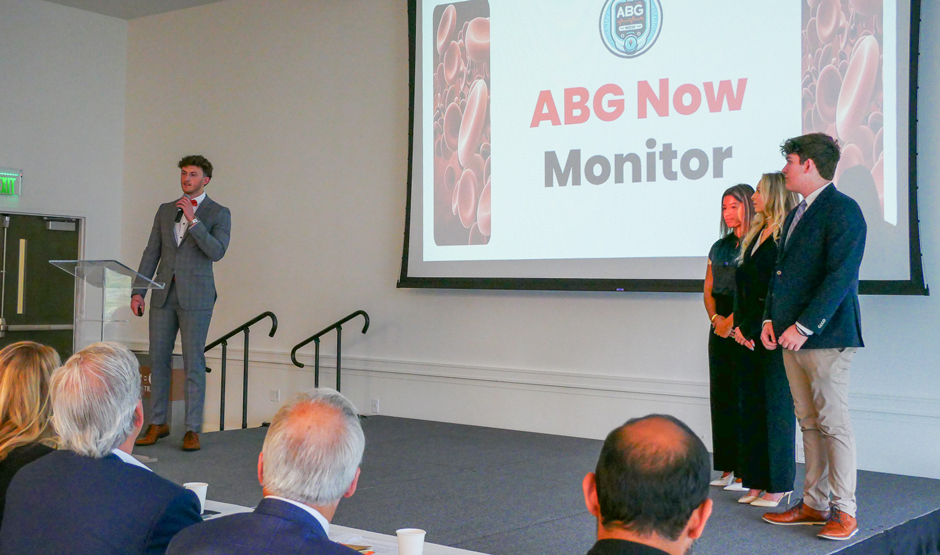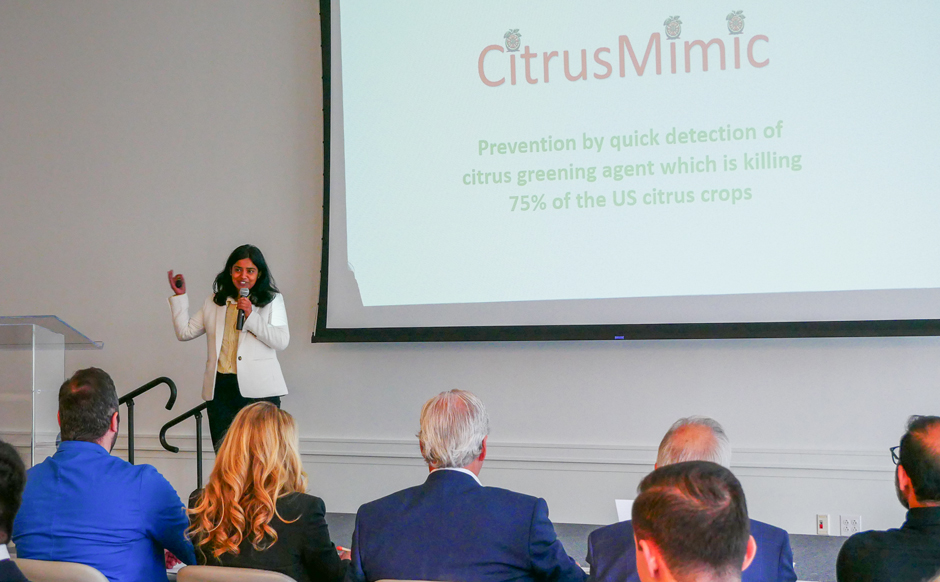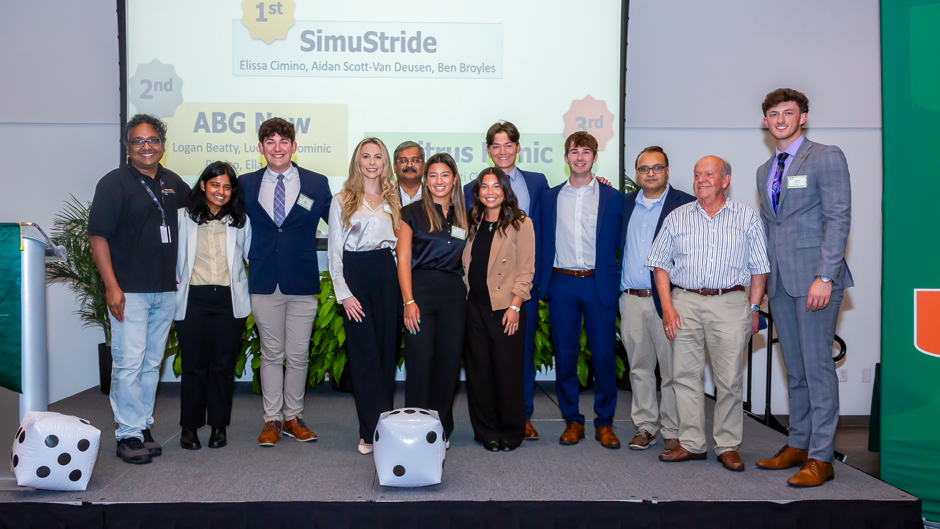SimuStride, a student startup that aims to help amputees transition to a prosthetic limb using augmented reality, won a $30,000 grant as part of the Rothberg Catalyzer Pitch Competition, hosted by the University of Miami College of Engineering.
The student team that founded SimuStride—junior biomedical engineering majors Ben Broyles, Elissa Cimino, and Aidan Scott-Vandeusen—competed against 14 other student teams before a panel of judges that are all venture capitalists, including sponsor Jonathan Rothberg. The trio were shocked to learn they edged out the others.
“We went into this with no expectations,” Cimino said, as Broyles and Scott-Vandeusen nodded in agreement. “We want this to be an opportunity for us to learn, get ahead, and to learn the design process.”
SimuStride aims to help amputees recover after surgery and to exercise their lower extremities to prevent muscle memory loss and phantom limb pain, which are common side effects of an amputation, Cimino said. Also, since most amputees do not typically receive a prosthetic until 10 months after surgery, they often struggle to use it because of muscle degradation. To counter these issues, the students designed and programmed a sleeve with sensors that could fit on a patient’s residual limb. This sleeve can connect electrical signals from the patient’s remaining leg muscles to an augmented reality headset. Then, the patient can exercise their existing muscles using a virtual leg they can see through the headset.
“Complications like phantom limb pain and muscle memory loss are worsened by the long period between amputation and prosthetic delivery,” Broyles said. “Our virtual prosthetic combats this by allowing amputees to begin training just days after surgery, not months.”

Added Cimino: “We met with a director of an amputee support group that expressed how some amputees feel frustrated when they are asked to imagine their limb is still there during therapy. We’re hoping this will give a more realistic form of hope for these patients—it may give them a sense of getting back to normalcy.”
A total of 15 teams were chosen as finalists for the competition at the end of March and received a $2,000 grant to develop their business idea into a prototype and present it. Now in its third year, the competition is funded by Rothberg, a scientist, geneticist, and entrepreneur, who has dedicated his life to creating businesses at the intersection of medicine, engineering, biology, and artificial intelligence.
“The Rothberg Catalyzer Pitch Competition is a testament to how the fusion of engineering principles with an innovative mindset can create impactful opportunities, not just for our students, but for society,” said Pratim Biswas, dean of the College of Engineering. “Each pitch reflected the high caliber of talent within the college, and underscored our commitment to fostering an entrepreneurial spirit that can lead to real-world solutions.”

The second-place winner, which will receive a $20,000 grant, was the ABG Now Monitor, a biomedical device created to measure and analyze blood gas values through an intra-arterial catheter, which is often administered to critical care patients. This would reduce the number of times that patients get their blood drawn in hospitals and offer health care providers faster updates on critical patients. It was devised by biomedical engineering seniors Ella Jacobs, Lucy Ho, Logan Beatty, and Dominic Pizzico.
“Our device would slide on to an arterial catheter and whenever a physician wanted to check a patient’s blood, within moments it would receive the instantaneous blood gas analysis,” said Jacobs, adding that blood gas values like the pH as well as blood-oxygen levels are crucial for doctors to monitor. “This is more efficient, it saves money, and it could provide physicians with real-time data that’s accurate. When a patient is in critical care, all those factors are really important.”
Third place—which comes with a $10,000 grant—went to CitrusMimic, an instrument created by doctoral candidate Shruti Choudhary, who is advised by Biswas, to quickly detect airborne traces of citrus greening, a disease that is killing 75 percent of America’s citrus crops. Since 2005, the disease has wreaked havoc on the citrus industry in Florida and California, with no cure in sight. Currently, quarantining sick plants is the only prevention strategy.
The CitrusMimic instrument would be deployed on farming equipment to continuously draw in air and test for the harmful bacteria, which is spread by an insect called the Asian citrus psyllid. Any insects found in the air would also be killed by the instrument, Choudhary added. She will be using the grant to test the instrument at a central Florida citrus farm soon and hopes to also devise solutions to prevent psyllids from spreading the infection once detected by the instrument.

“We are on a mission to turn around the citrus industry in Florida back to 2005, preventing citrus greening and catching and killing the insects before they infect the plant,” Choudhary said.
Other teams came up with an innovative bandage that could help identify and treat infected wounds, a troubling issue in the burgeoning U.S. diabetes population. Another diabetes-related application could help patients monitor their diet to prevent cognitive decline, which often occurs when diabetes symptoms progress.
Other competitors created helpful apps, such as Corsa Athletics, which can assist users to find a personal trainer based on their goals without a required monthly subscription. Another called Next Biotech would be a marketplace to help consumers find products that do not contain parabens, a potentially harmful man-made chemical often found in shampoos, cosmetics, and some foods.
To learn more about the Rothberg Catalyzer, contact software engineering lecturer, Lokesh Ramamoorthi or Samiul Amin, professor of practice in chemical, environmental, and materials engineering.

